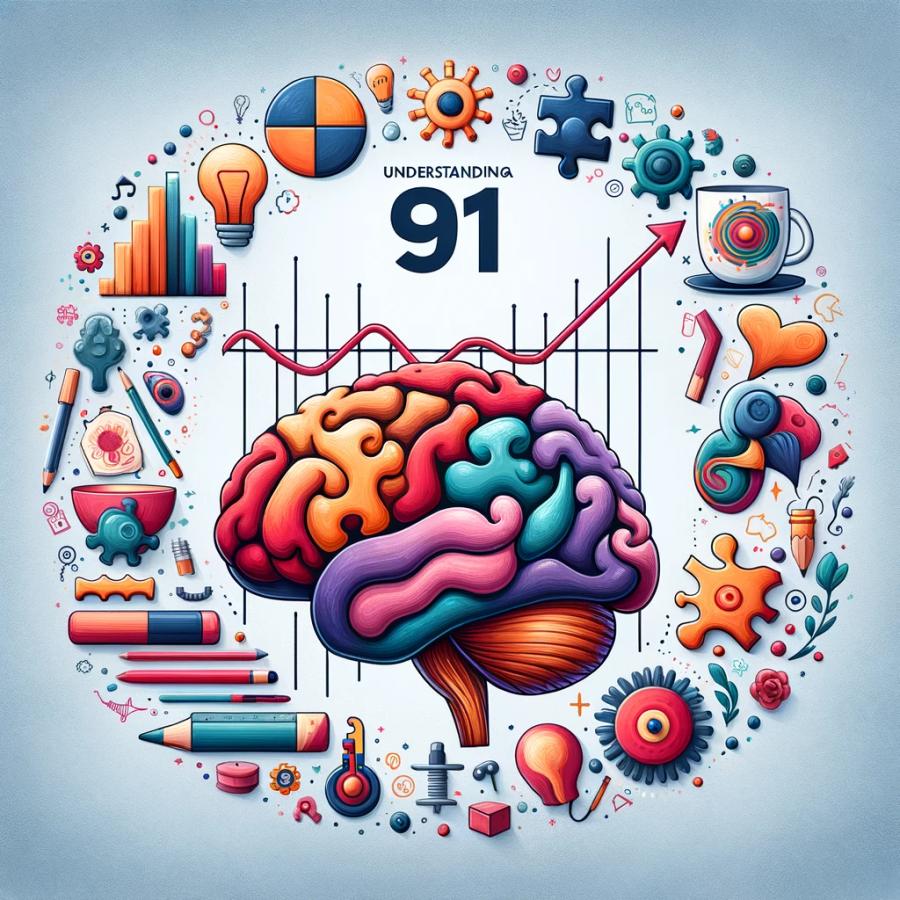Unlock The Secrets Of A 91 IQ: What It Really Means And Why It Matters
When we talk about an IQ score of 91, we're diving into a realm that's both fascinating and misunderstood. Picture this: a number that defines your cognitive abilities, but what does it truly represent? An IQ of 91 isn't just a random figure; it's a marker that tells a story about your mental capacity and how you compare to others. But hold up, before we dive deep, let's get one thing straight—your IQ doesn't define your worth. It's just one piece of the puzzle that makes you, well, you.
So, why are we so obsessed with IQ scores? Think about it—employers, schools, even dating apps are curious about this little number. But here's the kicker: an IQ of 91 doesn't have to be the end of the road. In fact, it can be the beginning of a journey toward understanding your unique strengths and how to leverage them in life.
As we explore what an IQ of 91 really means, we'll uncover how it impacts your daily life, career choices, and personal growth. This isn't just about numbers—it's about understanding yourself on a deeper level. So, buckle up because we're about to break down everything you need to know about an IQ score of 91.
- Indian Hot Web Series A Spicy Journey Into The World Of Streaming Entertainment
- Shanin Blake Leaked The Untold Story Behind The Viral Sensation
Table of Contents
- What Exactly is IQ?
- The Average IQ Explained
- Overview of an IQ of 91
- Implications for Your Career
- Understanding Learning Styles
- Ways to Boost Your IQ
- Debunking Common Myths About IQ
- The Role of Emotional Intelligence
- Real-Life Examples of Success
- Wrapping It Up
What Exactly is IQ?
Let's start with the basics. IQ stands for Intelligence Quotient, and it's a standardized way to measure cognitive abilities. It's like a snapshot of your brain's performance in areas like problem-solving, reasoning, and memory. But here's the thing: IQ isn't just about how smart you are—it's also about how you think and process information. And guess what? An IQ of 91 falls right within the average range, which means you're not alone. In fact, most people score between 85 and 115, so you're right in the mix.
How IQ Tests Work
IQ tests are designed to assess a variety of skills, including verbal comprehension, mathematical reasoning, and spatial awareness. These tests are standardized, meaning they're administered and scored in a consistent way. But don't let the word "standardized" scare you—it just means the results are reliable and comparable across different individuals. For example, if you score an IQ of 91, it means you're performing similarly to about 50% of the population.
The Average IQ Explained
Now, let's talk about what it means to have an average IQ. An IQ of 91 is considered average, but that doesn't mean it's ordinary. Think about it—average is the norm, and there's nothing wrong with being normal. In fact, many successful people have average IQs. What separates them from the pack isn't their IQ score, but their work ethic, determination, and ability to adapt. So, if you're rocking an IQ of 91, don't sweat it. You've got plenty of room to grow and succeed.
- Best Remoteiot Vpc Ssh Raspberry Pi Free Your Ultimate Guide
- Miaz And Girthmaster The Ultimate Duo Thats Taking The World By Storm
Why Average is Awesome
Having an average IQ doesn't mean you're limited in any way. In fact, it can be a strength. People with average IQs often excel in areas that require creativity, empathy, and practical skills. And let's not forget about emotional intelligence, which we'll dive into later. So, if you're wondering how an IQ of 91 can impact your life, the answer is: it depends on how you use it. With the right mindset and strategies, you can achieve greatness no matter your IQ score.
Overview of an IQ of 91
Alright, let's get specific. An IQ of 91 is solidly in the average range, but what does that mean for you? First off, it means you have a strong foundation of cognitive abilities. You can solve problems, think critically, and adapt to new situations. But here's the deal: your IQ score is just one aspect of your intelligence. There's so much more to you than a number on a test.
Strengths and Weaknesses
People with an IQ of 91 often excel in areas like communication, teamwork, and practical problem-solving. They might not ace every math test or memorize every fact, but they make up for it with their ability to connect with others and think outside the box. And let's be real—those skills are just as important, if not more, in today's world. So, if you're rocking an IQ of 91, focus on your strengths and work on improving your weaknesses. It's all about balance, baby.
Implications for Your Career
Now, let's talk about how an IQ of 91 can impact your career. Here's the deal: your IQ score can influence the types of jobs you're suited for, but it's not the only factor. Employers care about more than just numbers—they want to see your skills, experience, and attitude. So, if you're worried about landing your dream job with an IQ of 91, don't be. There are plenty of careers where an average IQ is more than enough to succeed.
Best Career Paths
- Teaching and Education
- Healthcare and Nursing
- Customer Service and Sales
- Arts and Design
- Entrepreneurship
These careers value skills like communication, empathy, and creativity—qualities that people with an IQ of 91 often excel at. So, if you're wondering what career path to pursue, consider these options and see where your passions lie.
Understanding Learning Styles
Here's another important factor to consider: learning styles. People with an IQ of 91 might not learn the same way as someone with a higher IQ, and that's okay. In fact, it's a good thing. Different learning styles mean different strengths, and understanding yours can help you succeed in school, work, and life.
Common Learning Styles
- Visual Learners: Learn best through images and diagrams
- Auditory Learners: Learn best through listening and discussions
- Kinesthetic Learners: Learn best through hands-on activities
- Reading/Writing Learners: Learn best through written materials
Identifying your learning style can help you tailor your approach to learning and make the most of your IQ score. So, if you're a visual learner, embrace the power of diagrams. If you're an auditory learner, lean into discussions and podcasts. It's all about finding what works for you.
Ways to Boost Your IQ
Here's the good news: IQ isn't set in stone. While your baseline IQ might be 91, there are plenty of ways to boost it. Think of your brain like a muscle—the more you use it, the stronger it gets. So, if you're looking to improve your cognitive abilities, here are some tips to get you started.
Effective Strategies
- Engage in brain games and puzzles
- Read regularly and explore new topics
- Exercise regularly to boost brain health
- Practice mindfulness and meditation
- Learn a new skill or language
These activities can help improve your memory, problem-solving skills, and overall cognitive function. So, if you're ready to take your IQ of 91 to the next level, get started today. Your brain will thank you.
Debunking Common Myths About IQ
Let's clear up some misconceptions about IQ. There are a lot of myths out there, and it's time to set the record straight. For example, did you know that IQ isn't fixed? Or that it doesn't determine your success in life? These myths can be misleading and even harmful, so let's break them down.
Top Myths
- Higher IQ always equals success
- IQ is the only measure of intelligence
- IQ can't be improved
- IQ tests are biased
By understanding these myths, you can approach your IQ score with a more balanced perspective. Remember, your IQ is just one piece of the puzzle. There's so much more to you than a number on a test.
The Role of Emotional Intelligence
Now, let's talk about emotional intelligence (EQ). EQ is just as important, if not more, than IQ when it comes to success in life. People with high EQs are better at managing emotions, building relationships, and handling stress. And guess what? EQ can be developed, just like IQ. So, if you're rocking an IQ of 91, don't worry—your EQ can help you succeed in ways that IQ alone can't.
Improving Your EQ
- Practice self-awareness
- Develop empathy for others
- Improve communication skills
- Learn to manage stress effectively
By focusing on your EQ, you can enhance your overall intelligence and improve your chances of success in life. So, don't underestimate the power of emotional intelligence—it's a game-changer.
Real-Life Examples of Success
Finally, let's look at some real-life examples of people who have succeeded despite having an average IQ. These stories are proof that IQ isn't the only factor in determining success. With hard work, determination, and a positive attitude, you can achieve great things no matter your IQ score.
Inspiring Stories
- Entrepreneurs who built successful businesses
- Artists who created groundbreaking works
- Community leaders who made a difference
- Teachers who inspired generations
These individuals prove that success isn't defined by a number. It's about what you do with the gifts you have and how you use them to make a difference in the world.
Wrapping It Up
So, there you have it—the scoop on an IQ of 91. It's not the end of the world, and it's certainly not the beginning. It's just one piece of the puzzle that makes you who you are. Remember, your IQ doesn't define your worth or your potential. It's just a starting point. With the right mindset, strategies, and support, you can achieve greatness no matter your IQ score.
So, what's next? Take action! Start exploring your strengths, improving your weaknesses, and developing your emotional intelligence. Share this article with someone who might benefit from it, and leave a comment below with your thoughts. Let's keep the conversation going and help each other grow.
- Amariah Morales Xxx Unveiling The Truth Behind The Name
- Anna Malygonleaks The Truth The Facts And What You Need To Know

91 IQ Suitable Jobs and Meanings iqtest

Understanding a 91 IQ Score

Shop TradeIQ Courses & Content